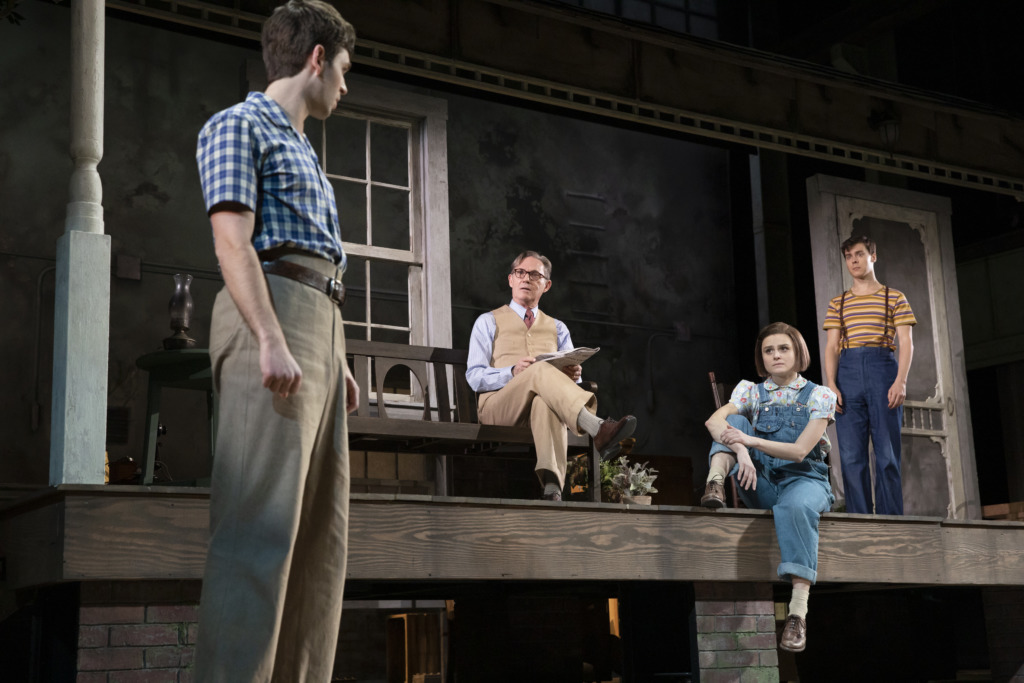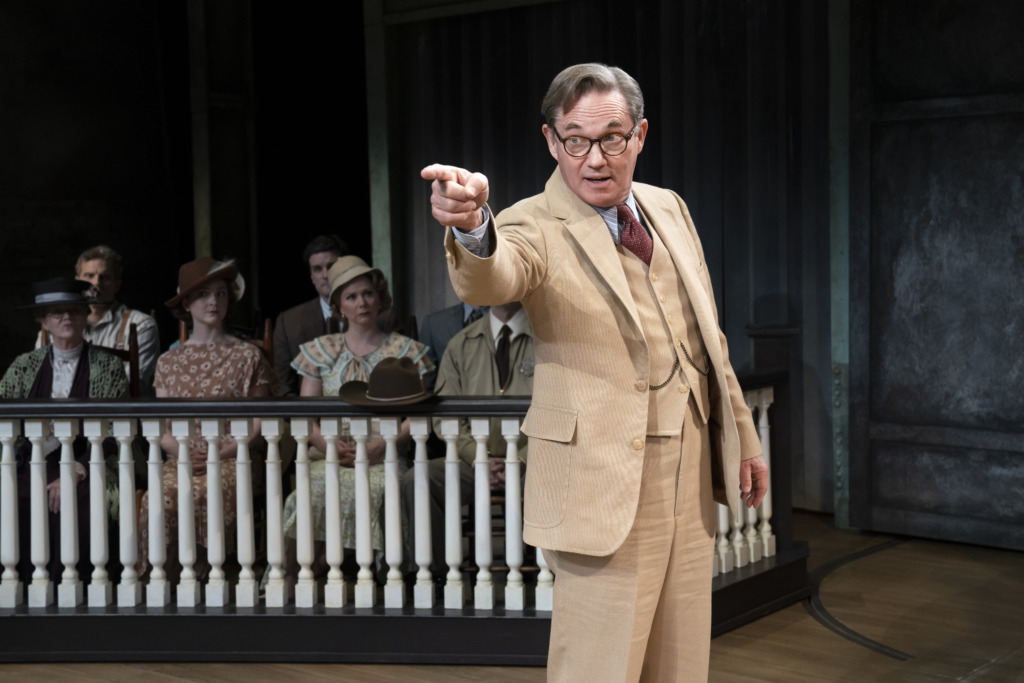If we needed a fresh take on this American classic, then playwright Aaron Sorkin has delivered it. Don’t get us wrong, this is still the Harper Lee story that most of us know and love, but it has been adapted in a 21st century manner, with some characterizations that are a bit more nuanced and, arguably, real. To summarize up front, this is a production we think everyone should see. Unfortunately, like so much entertainment with a powerful message, those who need to see it the most, likely never will.

In case you skipped English classes in school, Harper Lee’s To Kill a Mockingbird is a 1960 novel, set in a fictional Alabama town during the Great Depression, where the trial of a black man accused of raping a white woman is seen through the eyes of a child called Scout. Despite dealing with the serious issues of rape and racial inequality, the novel is renowned for its warmth and humor. Atticus Finch, the narrator’s father who agrees to defend Tom Robinson in the hothouse trial, has served as a moral hero for many readers and as a model of integrity for lawyers. The Pulitzer-prize winning novel has been adapted into various play versions, as well as the famous 1962 movie starring Gregory Peck as Atticus Finch, in an Academy-Award winning role.
Aaron Sorkin took on the task of creating a new script for Broadway a few years back. It was not without controversy. The estate of Harper Lee, which had given him permission, sued him while the play was in rehearsal due to the nature of several proposed changes in characterization. Some changes were allowed to be made, others nixed, and eventually we have the new script we see before us. The focus has been honed to the trial, the tale of Boo Radley has been whittled down to its barest essentials and the story is not always told in a straight line.
The characterization of Atticus is less inherently noble and stoic, yet the most notable change is that the main two Black characters, Calpurnia the maid and Tom Robinson the accused (played to perfection by Jacqueline Williams and Yaegel T. Welch respectively), have been given more of a voice. Tom tells us in his own voice the desperation of his current situation. Calpurnia is more forceful as a presence, and more willing to challenge others, as when we get Calpurnia’s exchange with her employer:
Calpurnia: Jem was stickin’ up for you and maybe a little bit for me and you made him say he was sorry.
Atticus: I believe in being respectful.
Calpurnia: No matter who you’re disrespecting by doin’ it.
However, despite these heavy topics, humor abounds in this production and time passes quickly. Richard Thomas as Atticus Finch is worth the price of admission alone. Beloved for his work on “The Waltons” TV show (for those old enough to remember that), he is a stage veteran who knows how to give a line reading a natural and inmate feeling. His Atticus is not fully noble, but rather a simple man who is trying his best to do the right thing. His friendly exchanges with everyone delight and make you believe he genuinely cares for the people of this town. Countering this, his intense and (even violent) outbursts at key moments of the play are effectively done, if a departure from the more stoic Atticus Finch we can admire from the novel and movie.

The story is still told through the eyes of Scout Finch, Atticus’s daughter. Melanie Moore does an admirable job carrying the weight of this story mostly on her shoulders. She shares her story telling dues with Justin Mark (who plays her brother Jem) and Steven Lee Johnson who plays Dill, an awkward boy vising for the summer. Though obviously not children, the three actors generate youthful physicality, attitude and emotion with great skill, scoring many of the evening’s most sustained laughs and tender moments. Together they keep this story moving and filled with energy in what could otherwise feel like a very static tale.
The cast overall is top notch. Strong choices were made and the reasons seemed obvious, with one possible exception. The interpretation of Bob Ewell, the father of the supposed rape victim, has been shied from one of genuine menace into a lighter, more buffoonish style. Joey Collins plays this unexpected interpretation well, but the missing menace of Ewell does lessen his function as an always-lurking threat in the final section of the play.
Arianna Gayle Stucki hits all the right strides from viciousness to pathos as Mayella Ewell, the woman accusing Tom Robinson of rape, and Mary Badham, the original Scout in the 1962 film, milks the humor of her scenes as mean neighbor Mrs. DuBose.
The most pleasant surprise was Anthony Natale as Link Deas, the employer of the accused. Natale’s performance rang true and believable. He gave voice to all of those who should speak up but feel too inhibited to do so. The character as written in this version is much richer than we have seen in the past and Natale embodies it so well, it seems hard to believe that the character was not written expressly for him.
The set and lights were beautiful: if any complaints could be made on the technical side, it is that the scene changes were a bit slow for my taste, although actors were tasked to keep their dialogue going while folding up stairs, and gliding set pieces.
We did hear a few rumblings around us about the volume of the sound being a bit low. It is difficult to play a soft-spoken person on stage and even more difficult to be the sound board op for such a character. Overall, the sound was fine and beer than being too loud which has been an issue at many theaters of late.
The show starts promptly on time, so don’t be late and intermission is just as strict and late seating is very late, so show up on me and watch for the flashing lobby lights!
Running Time: 2 hours and 35 minutes with one intermission
To Kill A Mockingbird plays through July 10, 2022 in the Opera House Theatre at The John F. Kennedy Center for the Performing Arts, 2700 F Street NW, Washington, DC. For tickets call the box office at (202) 467-4600 or purchase them online.
